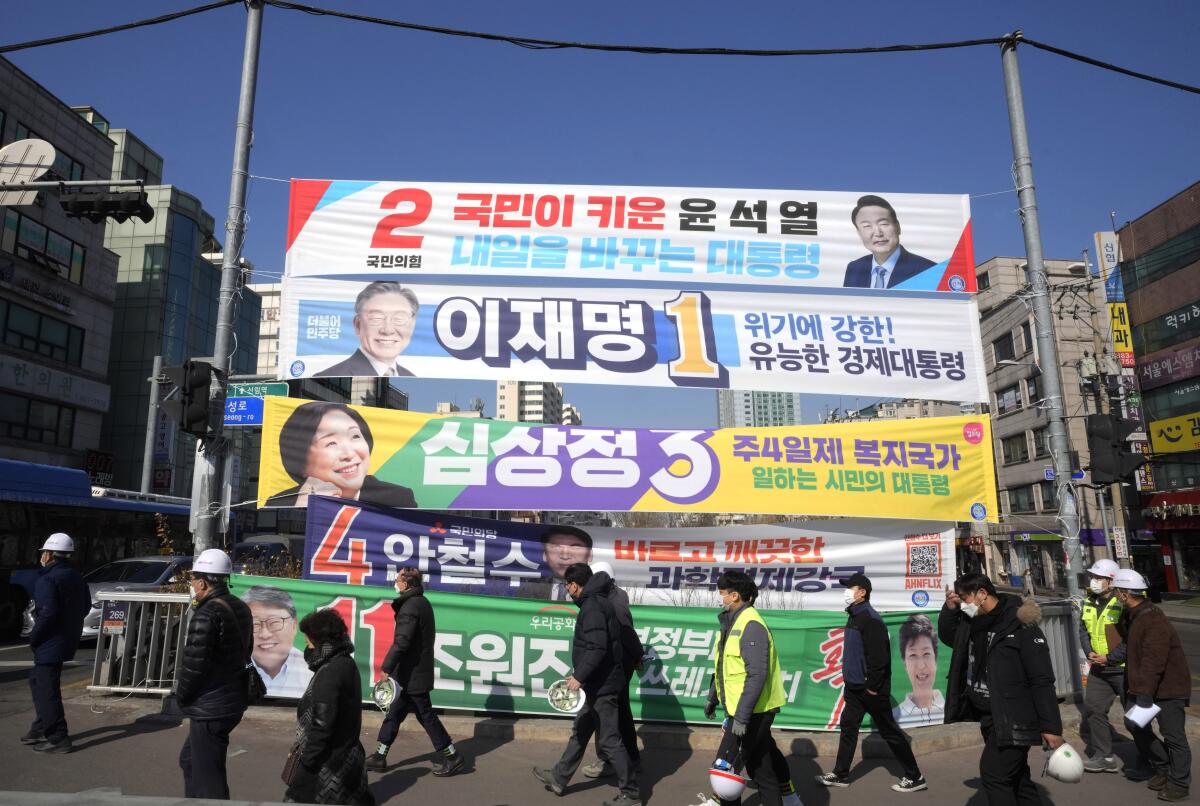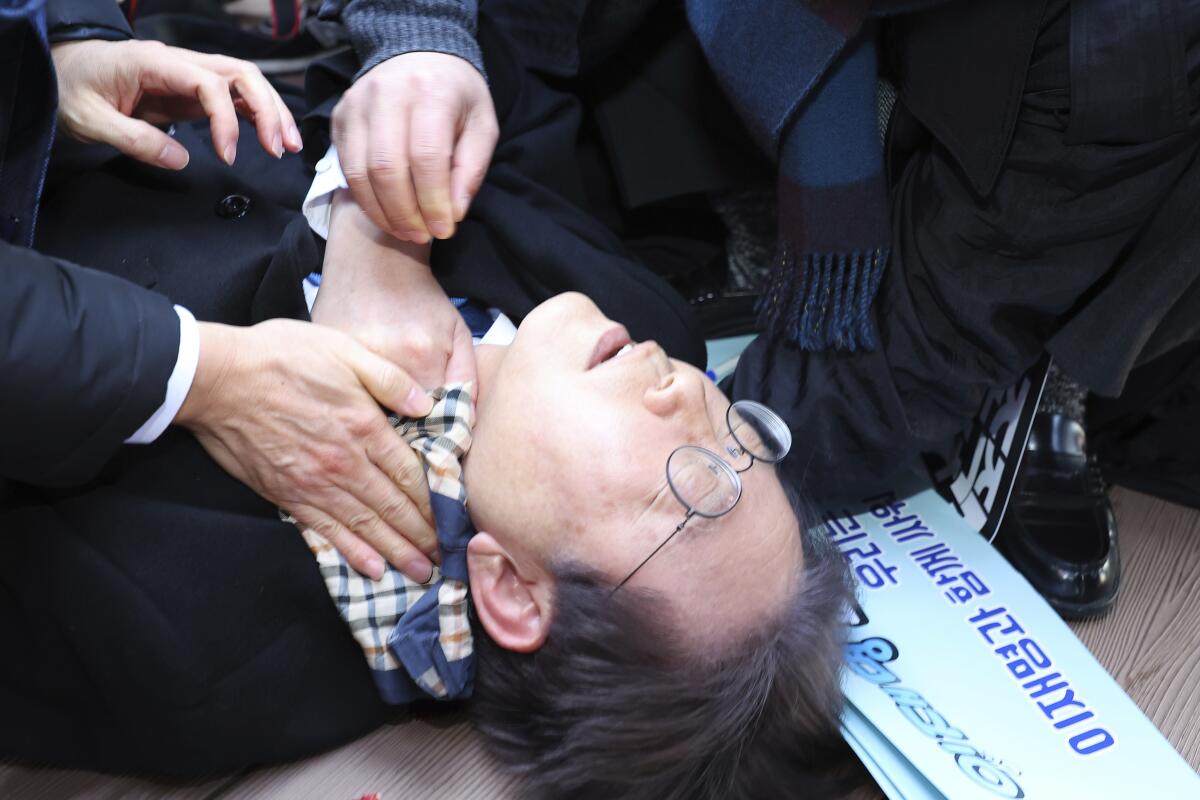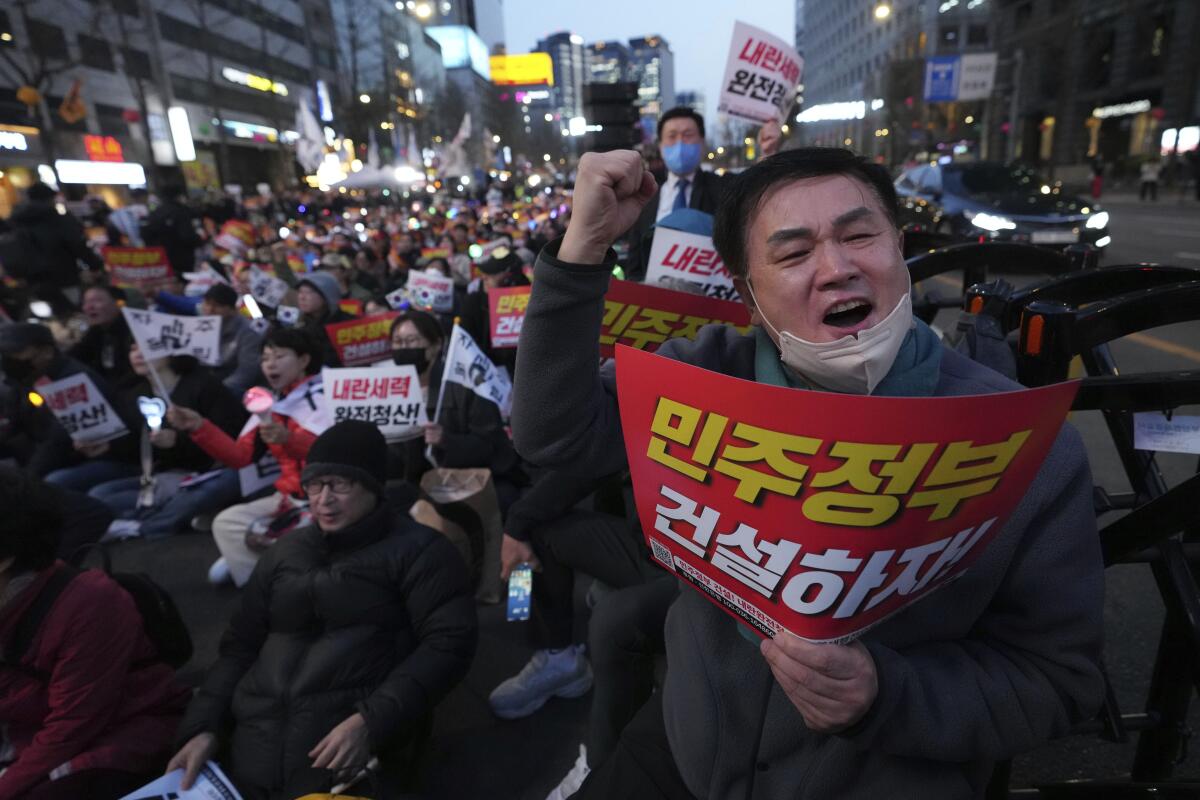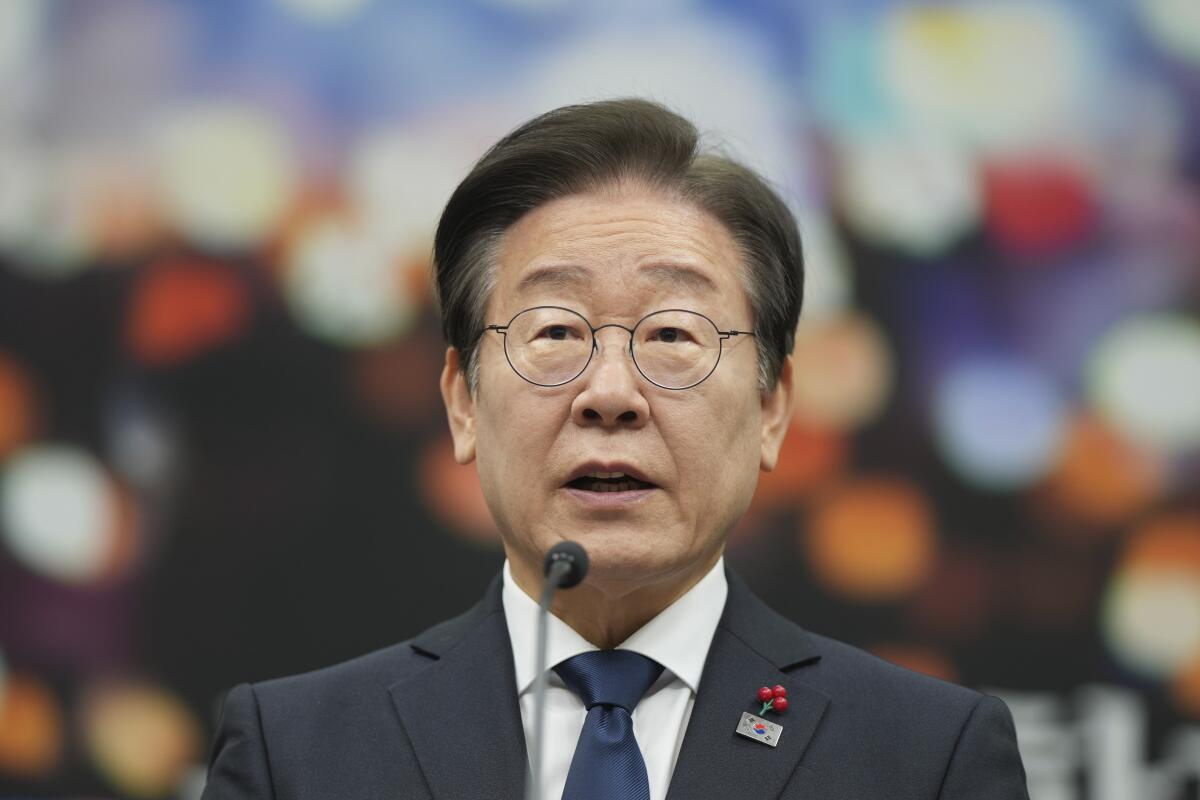SEONGNAM, South Korea — South Korean President-elect Lee Jae-myung has always described his politics as deeply personal, born of the “wretchedness” of his youth.
In his last presidential run three years ago, when his conservative opponent Yoon Suk Yeol, a former prosecutor, appealed to the rule of law, Lee told a story from his childhood: how his family’s poverty pushed him into factory assembly lines while his peers were entering middle school — and how his mother would walk him to work every morning, holding his hand.
“Behind every policy that I implemented was my own impoverished and abject life, the everyday struggles of ordinary South Koreans,” he said in March 2022. “The reason I am in politics today is because I want to create … a world of hope for those who are still suffering in the same puddle of poverty and despair that I managed to escape.”
Lee Jae-myung, foreground center, joins a rally against then-President Yoon Suk Yeol at the National Assembly in Seoul in December 2024.
(Ahn Young-joon / Associated Press)
Although Lee lost that race by 0.73 of a percentage point — or 247,077 votes — it was Yoon who set the stage for Lee’s comeback. Impeached halfway into his term for his declaration of martial law in December, the former president is now on trial for insurrection.
In the snap presidential election that took place Tuesday, the liberal Lee emerged the winner, with South Korea’s three major television broadcasters calling the race just before midnight here.
On the campaign trail, Lee framed his run as a mission to restore the country’s democratic norms. But he also returned to the theme that has, over the years, evolved from childhood yearning into his signature political brand: the promise of a society that offers its most vulnerable a “thick safety mat” — a way out of the puddle.
Born in December 1963, the fifth of seven siblings, Lee grew up in Seongnam, a city near the southeastern edge of Seoul that, by the time his family settled there in 1976, was known as a neighborhood for those who had been evicted from the capital’s shantytowns.
The family rented a single semi-basement room by a local market, where his father made a living as a cleaner. At times his family lived on discarded fruit he picked up along his route. Lee’s mother worked as a bathroom attendant just around the corner.
Lee spent his teenage years hopping from one factory to another to help. His first job, at 13, was soldering lead at a jewelry maker for 12 hours a day, breathing in the acrid fumes. At another job, the owner skipped out without paying Lee three months’ worth of wages.
A few years later, while operating a press machine at a baseball glove factory, Lee suffered an accident that permanently disfigured his left arm. In despair, Lee attempted to end his own life. He survived only because the pharmacist he went to for sleeping pills had caught wind of his intentions, giving him digestive medication instead.

Banners featuring ruling and opposition presidential candidates hang over a street in Seoul days before an election in March 2022.
(Ahn Young-joon / Associated Press)
Lee then began studying for middle school and high school at night after getting off work. He proved to be a gifted student, earning himself a full ride to Chung-Ang University to study law.
After passing South Korea’s bar exam in 1986, he was moved by a lecture given by Roh Moo-hyun, a human rights lawyer who went on to become president in 2003, and the 26-year-old Lee opened up his own legal practice to do the same.
Seongnam by then was rapidly developing, becoming the site of several projects, and Lee threw himself into local watchdog activism.
Ha Dong-geun, 73, who spent a decade organizing in the city with Lee, recalled the day they met: The latter wore an expression of great urgency — “like something bad would happen if he didn’t immediately hit the ground running.”
He added: “He wasn’t afraid of what others thought of him.”
Ha remembered Lee as a keen strategic mind, with a knack for “finding out his opponent’s weaknesses.” Yet despite the noise they made, substantive change proved harder to achieve, leading to Lee’s political awakening in 2004.
A year earlier, two of the city’s major hospitals had shut down, threatening the accessibility of emergency care in its poorest neighborhoods. But though Lee’s campaign had gathered nearly 20,000 signatures from residents to build a public hospital in their place, the proposal was struck down almost immediately by the city council.
“Those in power do not care about the health and lives of people unless there are profits to be made,” Lee wrote in 2021 of his reaction then. “If they won’t do it, let’s do it ourselves. Instead of asking for it from someone else, I will become mayor and do it with my own hands.”

Lee Jae-myung was attacked and injured during a January 2024 visit to the city of Busan in South Korea.
(Sohn Hyung-joo / Yonhap / AP)
Lee was mayor of Seongnam from 2010 to 2018. During that time, he repaid over $400 million in municipal debt left behind by his predecessor. He moved his office down from the ninth to the second floor, frequently appearing in person to field questions or complaints from citizens.
But he was best known for his welfare policies, which he rolled out despite intense opposition from the then-conservative central government: free school lunches, free school uniforms for middle-schoolers and financial support for new mothers seeking postpartum care. For all 24-year-old citizens, the city also provided an annual basic income of around $720 in the form of cash vouchers that could be used at local businesses.
In 2016, when the plight of a high school student who couldn’t afford sanitary pads using a shoe insole instead made national headlines, the city also added a program that gave underprivileged teenage girls cash for female hygiene products. A few years later, Lee also made good on his campaign promise to build the public hospital that had first propelled him into politics.
“My personal experiences made me aware of how cruel this world can be to those who have nothing,” he said in 2021.
Though it has been years since Lee left the city to become the governor of Gyeonggi province and to stage three presidential runs, his track record still inspires fierce loyalty in Seongnam’s working-class neighborhoods, where Lee is remembered as a doer who looked after even the little things.
“His openness and willingness to communicate resonated with a lot of people,” said Kim Seung-man, 67, a shop owner in Sangdaewon Market, where Lee’s family eked out a living in the 1970s. “Working-class people identify with him because he had such a difficult childhood.”

People shout slogans during a rally on April 4, 2025, to celebrate impeached South Korean President Yoon Suk Yeol’s removal from office by the Constitutional Court.
(Lee Jin-man / Associated Press)
And while the Seongnam Citizens Medical Center — which opened in 2020 — is deep in the red and has become a target for Lee’s critics who dismiss his welfare policies as cheap populism, Kim says it is a lifeline to this working-class neighborhood.
“It was a treatment hub for COVID patients during the pandemic,” he said. “Serving the public good means doing so regardless of whether it is profitable or not.”
Beyond Seongnam’s working-class neighborhoods, Lee has provoked in many an equally intense dislike — a fact that cannot be explained by his policies alone.
Some have attributed this to his brusque, sometimes confrontational demeanor, others to classist prejudice. Lee has pointed to his status as an “outsider” in the world of South Korean establishment politics, where the paths of most ambitious young politicians follow a script he has eschewed: getting in line behind a party heavyweight who will open doors to favorable legislative seats.
“I have never become indebted to anyone during my time in politics,” Lee said at a news conference last month.
He has faced attacks from within his own party, and conservatives have cast him as a tyrant and a criminal, noting allegations against him in legal cases. Former President Yoon cited the “legislative tyranny” of the Lee-led liberal opposition as justification for declaring martial law in December.
“There are still controversies over character or ethics trailing Lee,” said Cho Jin-man, a political scientist at Duksung Women’s University. “He doesn’t have a squeaky clean image.”
Since losing the 2022 election, Lee has faced trial on numerous charges, including election law violations and the mishandling of a real estate development project as mayor of Seongnam — indictments which Lee has decried as politically motivated attacks by Yoon and his allies.

Lee Jae-myung speaks during a Dec. 15 news conference about the impeachment of President Yoon Suk Yeol.
(Lee Jin-man / Associated Press)
Few of the allegations against Lee have stuck. Others, like an election law clause that prohibits candidates from lying during their campaigns, is an oft-abused technicality that would leave few politicians standing were it consistently enforced.
“On the contrary, these have only led to perceptions that there are problems with the prosecution service,” Cho said.
In recent months, Lee has tried to smooth the rougher edges of his public persona, vowing to mend the country’s increasingly combustible partisan rifts.
Last year, after he survived an assassination attempt in which the assailant’s blade nicked a major vein in his neck, Lee denounced the “politics of hate” that had taken root in the country, calling for a new era of mutual respect and coexistence.
In his recent campaign, Lee has billed his welfare agenda, which includes pledges for better labor protections as well as more public housing and public healthcare, not as class warfare but as commonsense pragmatism, reflecting his efforts to win over moderate conservatives.
But there are still questions whether Lee, whose party now controls both the executive and legislative branches, will be successful.
”He now has a clear path to push through what he wants very efficiently,” Cho said. “But the nature of power is such that those who hold it don’t necessarily exercise restraint.”
Although Lee has promised to not seek retribution against his political enemies as president, he has also made it clear that those who collaborated with former President Yoon’s illegal power grab will be held accountable — a move that will inevitably inflame partisan discord.
His working-class background has not staved off criticisms from labor activists, who say his proposal to boost the domestic semiconductor industry would walk back the rights of its workers.
That background will also do little for Lee’s first and most pressing agenda item: dealing with President Trump, whose tariffs on South Korean cars, steel and aluminum are set to fully go into effect in July.
“I don’t think Lee and Trump will have good chemistry,” Cho said.
“They both have such strong personalities, but they are so different in terms of political ideology and personal upbringing.”
This story originally appeared on LA Times

